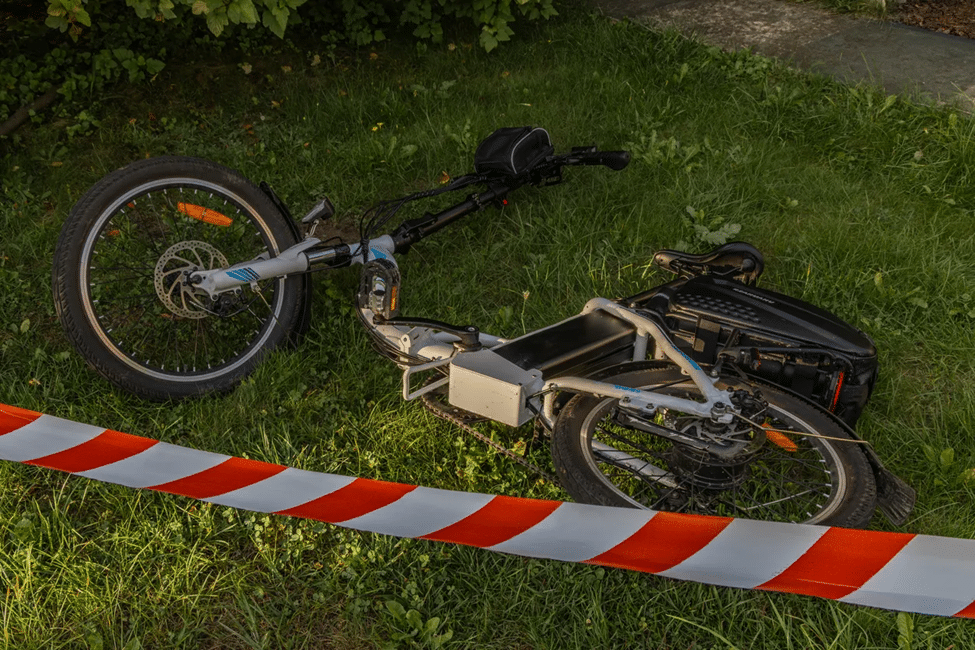When Convenience Turns Catastrophic: The Hidden Dangers of Amazon's E-Bike Marketplace
A recent lawsuit highlights the devastating consequences when defective products slip through Amazon’s safety net, leaving victims paralyzed and families shattered.
The promise of modern e-commerce is simple: order online, receive your product quickly, and trust that what you’re buying is safe. But for Robert Lewis, that promise became a nightmare that changed his life forever. On December 30, 2024, while riding a foldable electric bicycle purchased from Amazon, a critical mechanism designed to lock the handlebars malfunctioned. The handlebars folded, Lewis fell, and in an instant, he was paralyzed from the waist down.
This product liability case transcends a standard lawsuit—it illuminates the tangled web of culpability that arises when online retail platforms enable the sale of dangerous merchandise. The lawsuit, filed in the Los Angeles County Superior Court, names both Amazon and Actbest Technology Inc., the manufacturer, bringing to light fundamental questions about liability in modern e-commerce.
Amazon’s Expanding Liability: A Changing Legal Landscape
For years, Amazon successfully shielded itself from product liability claims by arguing that it was merely a “platform” connecting buyers and sellers, rather than the actual seller of third-party products. This legal strategy was effective in the brick-and-mortar world, but the digital marketplace has evolved far beyond simple classified ads.
The pivotal change in California’s legal landscape came with the landmark Bolger v. Amazon case, expertly handled by attorney Jeremy Robinson of SHK Law. In this landmark decision, the California Court of Appeal held that Amazon could be held strictly liable as a “seller” for defective products sold by third-party vendors on its marketplace. This decision significantly departed from earlier cases, where online platforms were shielded from liability. Bolger changed the legal landscape in California – opening the door for plaintiffs to pursue liability claims against Amazon and similar platforms for defective goods, regardless of who manufactured them. Building on this legal precedent, the Consumer Product Safety Commission (CPSC) later reinforced this position in July 2024, unanimously finding Amazon legally responsible for the recall of certain products sold by third-party sellers through its Fulfilled By Amazon (FBA) program, determining that Amazon acts as a “distributor” in these cases.
This evolution came after years of mounting pressure from consumer safety advocates who argued that Amazon’s active role in facilitating sales, processing payments, handling logistics, promoting products, and profiting from each transaction makes it far more than a passive intermediary.
The E-Bike Epidemic: A Pattern of Negligence
Lewis’s case isn’t isolated. The CPSC recently issued an urgent warning about the FENGQS F7 Pro e-bike battery, urging consumers to immediately stop riding these e-bikes due to severe fire and burn hazards. Approximately 180 of these e-bikes were sold directly on Amazon.com, and despite nine reports of fires, including two that caused $12,000 in property damage, the Chinese manufacturer has refused to agree to an acceptable recall.
The Lewis lawsuit alleges that Amazon has shown “a pattern of ignoring consumer complaints and obvious signs of design defects” when it comes to products sold on its website. The complaint draws parallels to the hoverboard crisis, stating that Amazon seeks to “profit off of a new consumer product space with complete disregard for the safety of its subscribers.”
The Real Cost of Defective Products
When examining the Lewis case, the human cost becomes starkly apparent. A man who was presumably healthy and active is now paralyzed, facing a lifetime of medical expenses, lost wages, and profound changes to his quality of life. His family, too, must adapt to this new reality, watching their loved one struggle with the consequences of a product that should have been safe.
The lawsuit seeks damages for:
- Past and future medical expenses
- Lost wages and diminished earning capacity
- Pain and suffering
- Loss of enjoyment of life
- Punitive damages
But beyond the monetary damages lies a more fundamental question: How do we prevent these tragedies from happening in the first place?
The Legal Challenge: Proving Amazon’s Responsibility
The multidimensional aspects of modern product liability cases, particularly those involving online marketplaces, demand sophisticated legal expertise. Victims face numerous challenges:
Jurisdictional Issues: With manufacturers often located overseas and Amazon operating across all 50 states, determining the most advantageous jurisdiction to file a lawsuit becomes crucial.
Discovery Challenges: Obtaining internal documents showing what Amazon knew about product defects and when requires aggressive litigation tactics and a deep understanding of corporate document retention policies.
Expert Witnesses: Proving product defects often requires testimony from engineers, safety experts, and medical professionals who can explain multifaceted technical issues to a jury.
Corporate Defense Teams: Amazon and major manufacturers employ teams of experienced defense attorneys who will aggressively challenge every aspect of a plaintiff’s case.
Strategic Legal Arguments in the Lewis Case
Successfully pursuing a product liability claim against Amazon requires navigating complex legal waters. The Lewis case employs several strategic arguments:
- Negligent Monitoring: The lawsuit alleges that Amazon failed to properly monitor product complaints and remove unsafe items despite voluntarily assuming this responsibility and promising consumers it would do so.
- Knowledge of Defects: The complaint claims Amazon had “long-held knowledge” of the e-bikes’ defects and dangers but chose not to act on this information.
- Duty to Consumers: The case argues that consumers reasonably relied on Amazon’s service to monitor product complaints and remove unsafe products, creating a duty that Amazon negligently breached.
The Broader Implications
The Lewis case represents more than one family’s tragedy—it’s part of a broader movement toward holding online marketplaces accountable for the products they facilitate selling. Legal experts note that the precedent set by SHK Law Jeremy Robinson’s victory in Bolger v. Amazon has created a new framework for understanding Amazon’s liability, demonstrating that Amazon’s active role in facilitating sales makes it more than just a passive intermediary.
This evolving legal landscape creates both opportunities and challenges for victims of defective products. While courts are increasingly willing to hold Amazon responsible, each case requires careful analysis of the specific facts and the platform’s role in the sale.
Moving Forward: Protection and Prevention
For consumers, the Lewis case serves as a sobering reminder to research products thoroughly before purchasing, especially from third-party sellers on online marketplaces. Look for:
- Proper safety certifications
- Clear manufacturer information
- Customer reviews that mention safety concerns
- Recalled product databases maintained by the CPSC
For the legal community, this case underscores the importance of staying current with the evolving field of product liability law, particularly as it relates to online marketplaces. The traditional rules are changing, and attorneys must adapt their strategies accordingly.
Conclusion
Robert Lewis’s life was forever changed by a defective product that should never have reached consumers. His lawsuit against Amazon and Actbest Technology represents not just a quest for personal justice but a broader fight for consumer safety in the digital age.
As online marketplaces continue to evolve and courts increasingly recognize their responsibility for product safety, cases like Lewis v. Amazon.com will shape the future of e-commerce liability. For now, victims of defective products must maneuver through an intricate legal system while dealing with the often devastating consequences of someone else’s negligence.
The question isn’t whether online marketplaces like Amazon should be held responsible for the products they help sell—it’s how quickly the law will evolve to match the reality of modern commerce and protect consumers from preventable tragedies.
If you or a loved one has been injured by a defective product purchased online, it’s crucial to consult with experienced product liability attorneys who understand the complexities of these evolving cases. Time limits for filing claims are strict, and early legal intervention can preserve critical evidence and protect your rights.
Contact SHK Law today for a free consultation: (818) 960-0011


